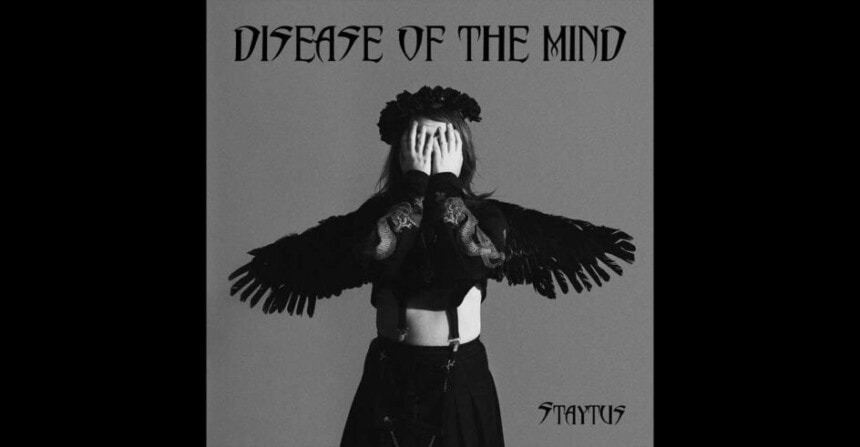Following the release of several singles, Staytus is proud to present Disease of the Mind, her debut album, available now on all the major services.
With an aggressive industrial metal sound that would make fans of genre heavyweights like Nine Inch Nails, Odonis Odonis, Black Dresses, Orgy, Static-X and God Lives Underwater proud, Staytus is constantly challenging the norm, with a nod to what has come before, while staying truly original and exciting in her delightfully destructive delivery.
“For those who haven’t listened to my music before, I can describe it as nu-goth, which borrows elements from industrial rock and grunge rock. It’s a journey that takes you into the mind of somebody struggling with mental illness.” – Staytus
Some select cuts from the record include the rollicking “Dreams From Hell”, about which Staytus remarked, “It’s a journey of experiencing abuse over and over again. The meaning of the song is about my struggles with PTSD and the symptoms that can come with it, such as intrusive/ruminating thoughts and self-harm. It’s like an endless cycle of remembering who hurt you. Listen to my lyrics, “I stay awake, I cannot take it anymore;” the conceptual, “A crooked sense of forgiveness;” and the plea of self-realization, “Maybe it’s time to wake up…”
Though we can all agree that home-recording gear is a wonderful thing, we shouldn’t forget how rare and special it is when artists blossom into full-blown producers by their own means. Disease of the Mind, the riveting full-length debut from industrial metal upstart Sam Grundemann—AKA Staytus—reminds us that some people are born with a knack for sculpting sound deep in their bones.
Since the age of 15, the Scottsdale, AZ-based multi-instrumentalist/songwriter has steeped herself in writing and recording her material, posting individual tracks while acquiring a string of degrees and certifications in audio production. Being patient and deliberate, however, has paid off—with Disease of the Mind, Staytus has crafted a lavishly detailed opus that envelops the senses as it pulls the listeners into its own sonic universe.
Aspiring to the wide-angle scope of genre-defining albums like Nine Inch Nails’ The Downward Spiral, Ministry’s Filth Pig and God Lives Underwater’s Life in the So-Called Space Age, Staytus leaves her mark on the industrial metal paradigm with an utterly distinctive approach to production and songcraft that reflects the ten years she’s spent honing her style in both domains.
“I had to write ‘Disease of The Mind’ to cope with my mental health struggles. I truly felt like a broken, fallen angel when I composed this album. Acknowledging your feelings of hurt, anger, and despair can help you move through them to find hope and relief.” – Staytus
Disease of the Mind also marries the classic palette of serrated guitars and electronic beats to contemporary concerns like relationship trauma, mental health, and the struggle of navigating a world based on “neurotypical” standards—all informed by the immersive audio-visual sensibility of gaming culture. As an avid fan of video games like Portal, Left 4 Dead, and Half-Life, Staytus channels the influence of game developers like Will Wright, Maxis, and Valve as much as she takes after other musicians. (The moniker Staytus, in fact, comes from the game Counter-Strike: Global Offensive.)
But as much as tracks like “Absolute Terror” and “Decay” percolate with the angst of early adulthood, with their sawblade-like distorted guitars wailing away in the mix, Grundemann has a most elegant touch when it comes to creating space in her music (captured this time with mixing assistance courtesy of Grammy-nominated producer Adam W. Berg). Yes, some of these songs get loud, but what stands out the most is her incomparable finesse.
On Disease of the Mind, the various sonic elements inter-weave like the holographic 3D-panel displays depicted in futuristic films like Prometheus and the anime classic Ghost in the Shell. And rather than simply hit you over the head with untempered rage, Disease of the Mind takes your breath away with a rare self-awareness that only enhances its raw expressions of despair. As a result, the music never completely expunges the beauty from its heart of darkness.
There’s an inherent romance to the way Grundemann arranges each aspect of a song with loving care—polishing or abrading the surfaces of her sonic architecture as she sees fit. And let’s not forget that Staytus might as well be synonymous with infectious dance grooves. On tracks like “Arrhythmia,” “Dreams from Hell”, “An Echo in Space” and “Part of Me”, Disease of the Mind matches the sting of lingering post-traumatic distress with a life-affirming sensuality.
On the album cover, a black-winged Staytus is shown covering her face with her hands, a dragon adorning each sleeve. This wasn’t simply a cosmetic wardrobe choice—for her, the archetypal symbol of the dragon represents something deeply powerful and, in its own way, real. Likewise, as you find yourself unable to resist moving your limbs as Disease of the Mind unfolds, an insistent shade of regeneration comes to life within the music.
“I don’t know what the hell I’ve been through,” Grundemann sings on album closer “Really Gone.” Maybe so, but what we do know is that what Disease of the Mind conveys most is resilience, as well as the arrival of a vital new presence on the industrial metal landscape.
Disease Of The Mind is performed, written, and produced by Staytus with final mixing/mastering by Adam W. Berg, Unity/Manifest Studios, Santa Monica, CA.
For More Info, Contact: mike.19thand7th@gmail.com
For Press Inquiries, Contact: Rick@RickEberleAgency.com


















